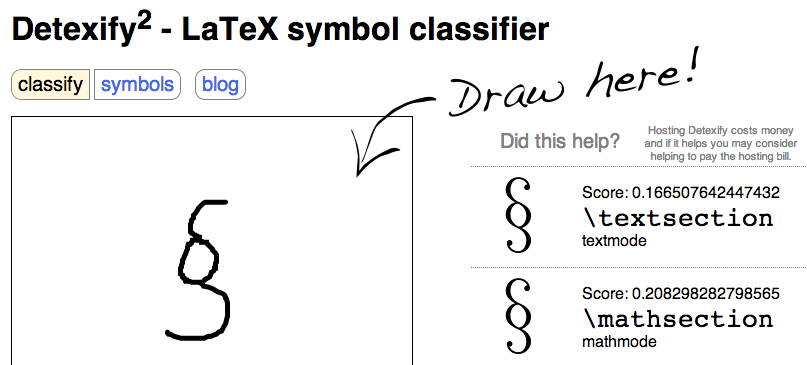November 17th, 2012 at 2:25 pm (Computers, Writing)
This is the coolest LaTeX doodad I’ve found in ages. Detexify is a brilliant combination of useful UI and machine learning. When you can’t remember what the latex command is to render a particular symbol, you simply DRAW it and Detexify gives you a ranked list of matches. You can then give it feedback about which one was what you wanted, which it uses to re-train its model and improve for the future.
I found this tool while trying to hunt down the LaTeX command for §, which I’d never used. Here’s what I drew:

Notice it has the correct command at the top of the list!
I love discovering new ways that machine learning can be used to make daily life easier. Well, in this case for those who use LaTeX on a daily basis. That’s everyone, right?
1 Comments
1 of 1 people learned something from this entry.
November 12th, 2012 at 11:03 pm (History, Literature)
The question is ill-formed, since Watson never existed outside of Sir Arthur Conan Doyle’s pages, which clearly indicate that he was a man. And yet… and yet… this tongue-in-cheek analysis of Watson’s gender is so delightfully entertaining that who cares whether the question makes sense? Read on. Read the case to support the claim that Watson was a woman.
P.S. I learned from this talk that there are a total of 60 Sherlock stories. What! I must have missed some of them. Time to go a-hunting.
Comments
November 10th, 2012 at 7:10 pm (Library School, Vocabulary)
In the preface to a book I am reading on medieval book curses (“Anathema!” by Marc Drogin), the author notes, “I am a researcher and not a scholar.”
That comment brought me up short, because if asked, I’d have been hard-pressed to come up with a distinction. A scholar studies things; so does a researcher. Given my personal research activities and inclinations, I’d probably distinguish them in that a researcher (in computer science, say) also strives to come up with new solutions to problems. “Scholar,” a term we don’t use nearly as much, might bring to mind a more static image of someone who’s accumulated a lot of historical knowledge and expertise. But these boundaries seem blurry.
And that isn’t at all the distinction Drogin meant! It turns out that to him, a scholar is an expert on a particular subject, studying it directly (using primary sources, perhaps?). A researcher comes along afterwards and studies the scholars’ output, collecting and analyzing it (secondary sources?). My world did a 90-degree turn and suddenly brought into focus what “research” must be for the humanities (and others?). What do those folks think when I say I am a “researcher”? Are we even speaking the same language?
This also solves a niggling question that’s been in the back of my mind since spending more time in the library world. When librarians talk about doing “research,” they almost always mean “hunting down a piece of information in existing sources” like databases, dictionaries, texts, etc. In my world, that’s not research; that’s information retrieval. So I frequently misunderstand the term when it comes up in my reading. This encounter in “Anathema!” may provide another experience to help me properly interpret the term in the world of library and information science.
P.S. I am still a researcher.
4 Comments
1 of 2 people learned something from this entry.
